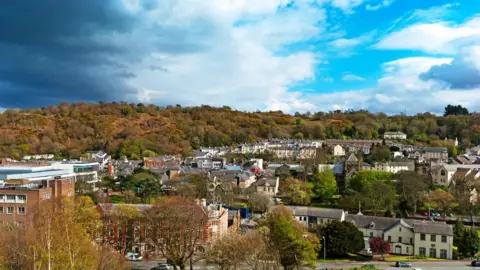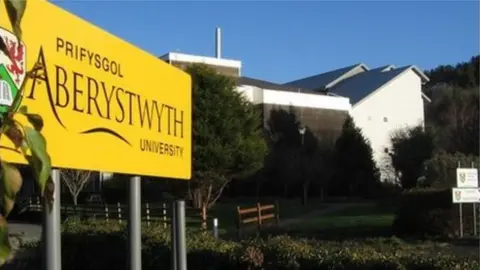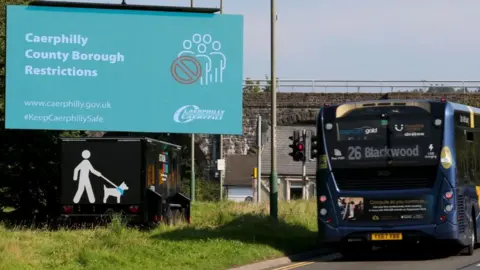Coronavirus: 'Rolling lockdowns' will become norm in Wales
 Getty Images
Getty ImagesPeople in Wales should "get ready" for rolling lockdowns over the winter months, Wales' chief medical officer has said.
Dr Frank Atherton said Wales could be "going in and out of those restrictions over the next few months".
Local lockdown areas now cover 2.3 million people living in Wales.
Latest figures now show rising rates in Gwynedd and Ceredigion, which may put them at risk of also facing new restrictions.
Public Health Wales recorded 21 new cases of Covid-19 in Gwynedd on Sunday, which pushed its weekly infection rate to 47 per 100,000 of the population.
Ceredigion is now at 32 cases per 100,000 of the population.

Both counties have reported cases linked to students, with face-to-face teaching suspended for a time in Aberystwyth.
Mr Atherton also said it was not "too surprising" to see outbreaks in some university communities.
"We saw that in Swansea, Aberystwyth and recently the same picture up in Bangor," he said.
"I hope that they would be containable in the student population. We don't want those outbreaks to leak into the general population."
Currently 15 out of of Wales' 22 counties are now facing local lockdown restrictions.
Gwynedd and Anglesey are the only two authorities in north Wales not under local lockdown restrictions.

Yesterday, Public Health Wales reported 432 people have tested positive for coronavirus, with no further deaths.
Speaking to BBC Radio Wales' Breakfast programme, Dr Atherton said he thinks areas will be "coming in and out" of local lockdown restrictions over the coming winter months.
"I think people need to get ready for that scenario," he said.
"We decide whether local restrictions are needed, and I suspect we may be going in and out of those restrictions over the next few months.
"If the number of cases per 100,000 over a seven day period, comes down to below the 50 per 100,000 level, we can start to think with the local authority, in partnership with them about lifting the restrictions.
"The worst thing is to lift them too early," he said.

How and when are local lockdowns triggered?
 Getty Images
Getty ImagesA joint approach is taken by health officials, the Welsh Government and local authorities to assess how, when and where an area may need to face additional coronavirus restrictions.
Officials want to know two things - the rate of infection and the percentage of positive tests coming back in a community.
- An area will be placed on a "watch list" when cases hit 15 per 100,000 of the population over a seven day period. Health officials and local authorities will meet to discuss the situation
- Amber: When an area hits about 25 cases per 100,000, and 2.5% of tests are positive, it is considered to be in an amber warning stage. Officials will want to establish whether there is a pattern to the cases. Is this an isolated cluster - or wider community transmission?
- Red: As cases approach 50 per 100,000, with a 5% positive test rate, an area moves to the stage where active intervention will be considered - such as local lockdown restrictions
One of the key questions for health officials is identifying wider community transmission, and wider risk factors.
For example, infection rates spiked in some communities linked to incidents at meat processing plants on Anglesey, Wrexham and Merthyr Tydfil. However, the source of the infection was known and isolated - and no further local lockdown measures were required.
However, in the case of Caerphilly, no individual cluster could be found, and measures were introduced, making it the very first council area to face such measures.
In north Wales, while infection rates were lower in places such as Conwy, a much higher number of elderly residents in the local populations meant a higher health risk, prompting action there.

- SOCIAL DISTANCING: How have rules on meeting friends changed?
- FACE MASKS: When do I need to wear one?
- TESTING: How do I get a virus test?
- SYMPTOMS: What are they and how to guard against them?
- LOOK-UP TOOL: How many cases in your area?
